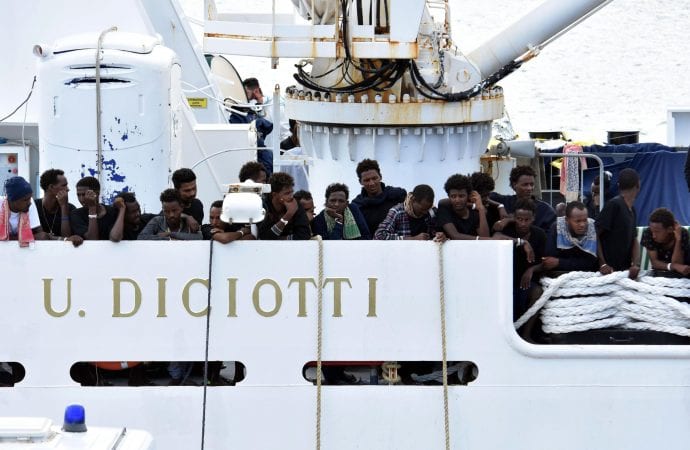In the run up to Ukraine’s May election, in which comedian and total electoral novice Volodymyr Zelensky trounced incumbent President Petro Poroshenko, the two men had just one debate. Poroshenko referred to his opponent’s youth and inexperience, to which Zelensky responded with a great candidate for the political truth of the early 21st century.
“Mr. President, I am not your opponent,” Zelensky said. “I am your verdict.”
The message was clear: We wouldn’t be here if you and the entire old guard you represent hadn’t failed so colossally, becoming infamous for the two deadly sins of statecraft - corruption and incompetence.
In Europe today, much the same thing could be said of Matteo Salvini, Italy’s hardline Deputy Prime Minister, whose anti-immigrant stance routinely elicits concern and condemnation from so-called “responsible” European leaders. The thing is, Matteo Salvini isn’t a defector from the EU, he’s the verdict on its own failure to manage the continent’s migration crisis.
All this comes to mind in light of the latest political standoff involving a boat groaning with migrants refused entry by Salvini, in this case not a vessel belonging to a do-gooder NGO but part of the Italian Coast Guard’s own fleet, the Gregoretti. (The ship’s normal role is to police fishing activities in the Mediterranean.)
On Thursday, the cruiser rescued a little over 140 migrants who had set off from the Libyan coast on two rickety boats in danger of capsizing. At first Salvini refused even to allow the boat to return to port, then on Sunday allowed it to dock in the Sicilian port of Augusta. Since then a pregnant woman and sixteen unaccompanied minors have been allowed to disembark, but everyone else, including the 31-member crew, is stuck on board by government order.
Salvini has vowed that nobody’s going anywhere until the EU agrees on a deal to share the load, so Italy doesn’t end up being responsible for absorbing all the new arrivals by itself. He’s framed it as a matter of national pride, insisting on Twitter that “Italians aren’t anybody’s servants or slaves, period.” In another tweet he boasted, “Italy has raised its head … we don’t take orders and we’re nobody’s lady-in-waiting.”
The rescue by the Gregoretti took place on the same day that another 115 migrants are believed to have drowned in the Mediterranean after a shipwreck, also off the Libyan coast.
So far there’s been little public comment on the situation from leaders of the Italian Catholic Church, but over the weekend opposition Senator Edoardo Patriarca said that an intervention by the Church may be the only exit strategy.
Patriarca invoked a similar case last year, when another Coast Guard vessel, the Diciotti, was sequestered with 177 migrants on board in a port in southern Italy for 10 days until a deal was worked out, which involved the Italian Church vowing to care for the migrants and to assume financial responsibility.
It’s not clear such a solution would work this time even if the Italian Church were to offer, since Salvini appears determined to use the standoff to force the EU’s hand, insisting that only a deal at the European level will suffice.
In turn, that stance creates the intriguing possibility that the Gregoretti could be the debut of a partnership between the EU’s new leader, Ursula von der Leyen, and Pope Francis.
In her programmatic speech in July ahead of the narrow vote confirming her as the new President of the European Commission, von der Leyen said the so-called “Dublin Rules” have to change, which oblige the first EU member state that receives an asylum-seeker to take care of him or her. In effect, those rules disproportionately burden front-line states such as Greece and Italy, since they’re where the bulk of today’s migrants show up.
The Italian contretemps thus creates an opportunity for von der Leyen to exercise leadership, brokering an arrangement among member states to absorb new arrivals such as those currently in limbo aboard the Gregoretti in a more equitable fashion.
In trying to make that work, Pope Francis, already history’s most pro-migrant pope, could lend a helping hand. One could imagine, for instance, Francis volunteering the services of the Catholic Church in all member EU nations to take a lead role on the ground in providing care for the new arrivals, much as the Church in Italy has done for years. In effect, the offer would be: “If you let these people in, we’ll make sure they’re not a burden on the state.”
Such a model would not only solve the short-term problem of the Gregoretti, but it could provide a template for a broader European solution to the migrant crisis. For bonus points, it would mark a new level of church/state cooperation in the world’s most deeply secular zone and also take some wind out of the sails of populists such as Salvini, who would no longer have a dysfunctional EU to rail against.
Whether such a partnership will emerge is anyone’s guess, in part because Francis has taken a largely hands-off role on the politics of Italy and Europe in general. During the European elections in late May, he deferred to the continent’s bishops rather than engaging the issues himself. Also, there’s no particular reason to believe von der Leyen is capable of the inspired leadership it would require, especially at a moment when her legitimacy as Europe’s chief executive is still being questioned.
Yet even if it’s a long shot, it may still be the best bet the 132 souls still aboard the Gregoretti have.

